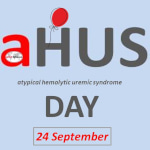aHUS Awareness Day Date in the current year: September 24, 2026
 aHUS Awareness Day is observed annually on September 24. It was created to raise awareness of atypical hemolytic uremic syndrome, an extremely rare, life-threatening disease that affects multiple organs and systems.
aHUS Awareness Day is observed annually on September 24. It was created to raise awareness of atypical hemolytic uremic syndrome, an extremely rare, life-threatening disease that affects multiple organs and systems.Atypical hemolytic uremic syndrome (aHUS) is a progressive disease characterized by uncontrolled activation of the complement system, which is part of the immune system that enhances the ability of antibodies and phagocytes to attack foreign substances. Typically, the complement system is tightly regulated to prevent damage to healthy tissues and organs. In people with aHUS, however, it becomes overactive and attacks the lining of small blood vessels. This results in a pathology called thrombotic microangiopathy (TMA). TMA is characterized by the formation of blood clots in small vessels, which can lead to a heart attack, stroke, kidney failure, and ultimately, death.
aHUS is typically caused by a mutation in a gene that encodes a complement regulatory protein. It may also be triggered by the production of antinuclear antibodies that attack the body’s own cell nuclei. This can be caused by infections, certain medications, and other factors. The disease can develop at any age.
Early signs and symptoms can include fatigue, confusion, abdominal pain, swelling, nausea, vomiting, and diarrhea. However, many patients experience an abrupt onset of severe systemic symptoms, such as high blood pressure, stroke, heart attack, pancreatitis, acute kidney failure, liver necrosis, seizures, encephalopathy, and coma.
Until recently, the prognosis for patients with aHUS was very poor. An estimated one-third of patients died during the first bout of clinical symptoms, while the rest died within the first year after diagnosis or required dialysis due to kidney failure. This began to change in 2011 when the FDA approved eculizumab (Soliris) to treat aHUS. This medication inhibits the activation of the complement system. Another approved medication for aHUS is ravulizumab-cwvz (Ultomiris).
Patients with aHUS who develop kidney failure generally require lifelong dialysis, which has an average five-year survival rate of 35–45%. Without treatment with aHUS medication, kidney transplantation is ineffective because most patients will develop TMA in the transplanted organ.
aHUS Awareness Day was launched in 2015 by the aHUS Alliance, a global umbrella organization that connects and supports aHUS patient groups, families, clinicians, and researchers to improve awareness, advocacy, and collaboration. The day’s main goals are to raise global awareness of this rare disease and support affected families.
September 24 was chosen as the date because the term hemolytic uremic syndrome was first used in medical literature during the same week in 1955. The term was coined by Swiss pediatrician and hematologist Conrad von Gasser, who described the syndrome with his colleagues at the Children’s Hospital Zurich (Kinderspital Zürich). aHUS Awareness Day events are organized by aHUS patient organizations, as well as national and international rare disease groups.
- Category
- International Observances
- Tags
- aHUS Awareness Day, atypical hemolytic uremic syndrome, international observances, awareness days, rare diseases